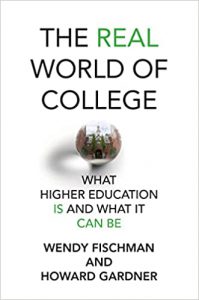Check out this selection of new ebooks recently added to the RLB Library’s collection:
 Authenticity: Building a Brand in an Insincere Age by Mark Toft, Jay Sunny, Rich Taylor.
Authenticity: Building a Brand in an Insincere Age by Mark Toft, Jay Sunny, Rich Taylor.
“Too many companies depend on marketing tactics that don’t match the needs and concerns of their customers or embrace messaging and causes that don’t connect. Authenticity is an anti-gimmick business book. It prescribes clear strategies that enable companies to communicate in a more genuine, emotional way.
Authors Mark Toft, Jay Sunny, and Rich Taylor provide a series of approaches to help embrace and communicate the purpose of your brand with effectiveness. Whether you’re a business executive who wants to be more persuasive or an advertising professional looking to grow your brand, this book combines the authors’ successful experiences at top agencies into practical advice that can work for anyone in any business.
Readers will learn the importance of purpose and conflict in marketing activities, how to approach advertising with clarity and passion, and how to plan content while avoiding the false allure of aspirational advertising and insincere corporate social responsibility. Inauthentic messaging can often spell failure for a business, but the company that tells a genuine, compelling story to its clients is the one that succeeds.”–Provided by publisher.
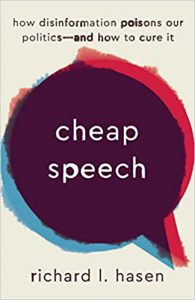 Cheap Speech: How Disinformation Poisons Our Politics–and How to Cure It by Richard L. Hasen.
Cheap Speech: How Disinformation Poisons Our Politics–and How to Cure It by Richard L. Hasen.
“What can be done consistent with the First Amendment to ensure that American voters can make informed election decisions and hold free elections amid a flood of virally spread disinformation and the collapse of local news reporting? How should American society counter the actions of people like former President Donald J. Trump, who used social media to convince millions of his followers to doubt the integrity of U.S. elections and helped foment a violent insurrection? What can we do to minimize disinformation campaigns aimed at suppressing voter turnout? With piercing insight into the current debates over free speech, censorship, and Big Tech’s responsibilities, Richard L. Hasen proposes legal and social measures to restore Americans’ access to reliable information on which democracy depends. In an era when quack COVID treatments and bizarre QAnon theories have entered mainstream, this book explains how to assure both freedom of ideas and a commitment to truth.”–Provided by publisher.
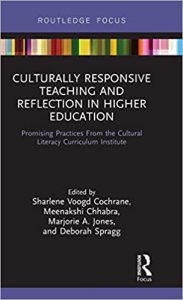 Culturally Responsive Teaching and Reflection in Higher Education: Promising Practices From the Cultural Literacy Curriculum Institute by Sharlene Voogd Cochrane.
Culturally Responsive Teaching and Reflection in Higher Education: Promising Practices From the Cultural Literacy Curriculum Institute by Sharlene Voogd Cochrane.
“This book explores how post-secondary educators can develop their own cultural awareness and provide inclusive learning environments for all students. Discussing best practices from the Cultural Literacy Curriculum Institute at Lesley University, faculty and administrators who are committed to culturally responsive teaching reflect on how to create an inclusive environment and how educators can cultivate the skills, attitudes, and knowledge necessary for implementing culturally responsive curriculum and pedagogy. Rather than a list of “right answers,” essays in this important resource integrate discussion and individual reflection to support educators to enhance skills for responding effectively to racial, cultural, and social difference in their personal and professional contexts. This book is as an excellent starting point or further enrichment resource to accompany program or institutional diversity and inclusion efforts.”–Provided by publisher.
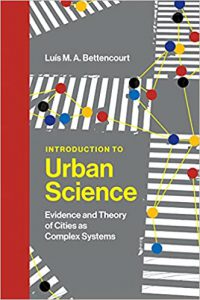 Introduction to Urban Science: Evidence and Theory of Cities as Complex Systems by Luis M.A. Bettencourt.
Introduction to Urban Science: Evidence and Theory of Cities as Complex Systems by Luis M.A. Bettencourt.
“Human beings around the world increasingly live in urban environments. In Introduction to Urban Science, Luis Bettencourt takes a novel, integrative approach to understanding cities as complex adaptive systems, claiming that they require us to frame the field of urban science in a way that goes beyond existing theory in such traditional disciplines as sociology, geography, and economics. He explores the processes facilitated by and, in many cases, unleashed for the first time by urban life through the lenses of social heterogeneity, complex networks, scaling, circular causality, and information.”–Provided by publisher..
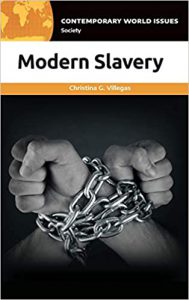 Modern Slavery: a Reference Handbook by Christina G. Villegas.
Modern Slavery: a Reference Handbook by Christina G. Villegas.
“This book addresses essential questions about slavery in its contemporary manifestations. It examines the growing epidemic and recent contexts of modern slavery in the United States and throughout the world, and describes in detail what caused it, whom it impacts, and what can be (and is being) done about it. It also explores the various contributing factors and how governmental and nongovernmental agencies can better engage in prevention and eradication.”–Provided by publisher.
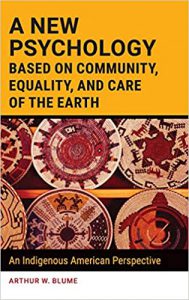 A New Psychology Based on Community, Equality, and Care of the Earth: an Indigenous American Perspective by Arthur Blume.
A New Psychology Based on Community, Equality, and Care of the Earth: an Indigenous American Perspective by Arthur Blume.
“Explains Native American psychology and how its unique perspectives on mind and behavior can bring a focus to better heal individual, social, and global disorders”– Provided by publisher.
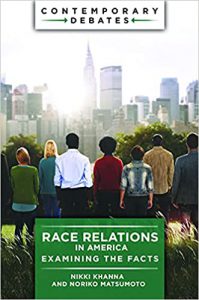 Race Relations in America: Examining the Facts by Nikki Khanna and Noriko Matsumoto.
Race Relations in America: Examining the Facts by Nikki Khanna and Noriko Matsumoto.
“This book is an essential resource for anyone who wants to understand race in America, drawing on research from a variety of fields to answer frequently asked questions regarding race relations, systemic racism, and racial inequality”– Provided by publisher.
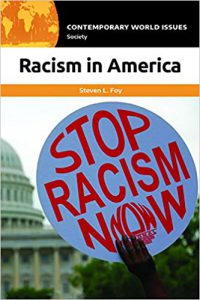 Racism in America: a Reference Handbook by Steven L. Foy.
Racism in America: a Reference Handbook by Steven L. Foy.
“This book diverges from the typical focus of accounts of racism on interpersonal prejudice and discrimination to situate racism within structural processes to demonstrate the systematic nature of racial discrimination. Racial progress, though notable, has largely addressed symptoms of the racialized social system rather than tackling the ways in which the system is inherently patterned to benefit whites. This book provides evidence that racial discrimination is not an occasional decision made by individuals.The book provides readers with a background and history of race in America; a thorough treatment of the problems, controversies, and solutions related to race; a perspectives section including essays from experts in a variety of related fields; profiles of important people and organizations; and a section dedicated to data and documents. Its organizational strategy benefits the reader, first explaining core concepts and providing context for racism in America before moving into more specific applications in the work of relevant experts and providing directions for further study.”–Provided by publisher.
The Real World of College: What Higher Education Is and What It Can Be by Wendy Fischman and Howard Gardner.
“Why higher education in the United States has lost its way, and how universities and colleges can focus sharply on their core mission.
For The Real World of College, Wendy Fischman and Howard Gardner analyzed in-depth interviews with more than 2,000 students, alumni, faculty, administrators, parents, trustees, and others, which were conducted at ten institutions ranging from highly selective liberal arts colleges to less-selective state schools. What they found challenged characterizations in the media: students are not preoccupied by political correctness, free speech, or even the cost of college. They are most concerned about their GPA and their resumes; they see jobs and earning potential as more important than learning. Many say they face mental health challenges, fear that they don’t belong, and feel a deep sense of alienation. Given this daily reality for students, has higher education lost its way? Fischman and Gardner contend that US universities and colleges must focus sharply on their core educational mission.
Fischman and Gardner, both recognized authorities on education and learning, argue that higher education in the United States has lost sight of its principal reason for existing: not vocational training, not the provision of campus amenities, but to increase what Fischman and Gardner call “higher education capital”—to help students think well and broadly, express themselves clearly, explore new areas, and be open to possible transformations. Fischman and Gardner offer cogent recommendations for how every college can become a community of learners who are open to change as thinkers, citizens, and human beings.”–Provided by publisher.
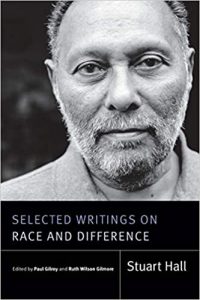 Selected Writings on Race and Difference by Stuart Hall, edited by Paul Gilroy and Ruth Wilson Gilmore.
Selected Writings on Race and Difference by Stuart Hall, edited by Paul Gilroy and Ruth Wilson Gilmore.
“Editors Paul Gilroy and Ruth Wilson Gilmore gather more than twenty essays by Stuart Hall that highlight his extensive and groundbreaking engagement with race, representation, identity, difference, and diaspora. Spanning the whole of his career, this collection includes classic theoretical essays such as “The Whites of Their Eyes” (1981) and “Race, the Floating Signifier” (1997). It also features public lectures, political articles, and popular pieces that circulated in periodicals and newspapers, which demonstrate the breadth and depth of Hall’s contribution to public discourses of race. Foregrounding how and why the analysis of race and difference should be concrete and not merely descriptive, this collection gives organizers and students of social theory ways to approach the interconnections of race with culture and consciousness, state and society, policing and freedom.”–Provided by publisher.
Questions? Please contact Debbie Li at dli@ubalt.edu.
